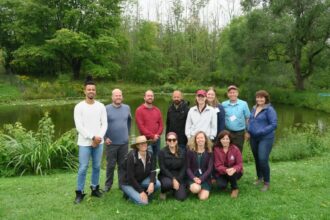A group of agricultural service providers from across the country met last month in Ithaca, NY, for a biannual tour program which highlights the unique features and deep-rooted connections of farms in each of the four SARE regions.
The SARE Fellows program offers participants the opportunity to, over the course of two years, learn in-person from farmers and researchers in the Northeast, Southern, North Central, and Western regions of the United States.
The Ithaca trip included visits to Homer C. Thompson Vegetable Research Farm, Well Spring Forest Farm, Crosswinds Farm & Cremery, Westhaven Farm, Groundswell Incubator Farm, and Finger Lakes Cider House & Good Life Farm.
Thomas Wheet, Senior Associate for Sustainability at Daily Harvest, is in the second year of his Fellowship. The diversity of farms around Ithaca was a juxtaposition to his previous fellow’s trip to Wyoming, where there was a lot of driving between farms and ranches.
“To have this level of access of food with this many different types of growers doing different things is just amazing,” Wheet said.
Wheet says the Fellows program has furthered his belief in sustainable agriculture and broadened his interest beyond soilless growing into traditional soil-based techniques.
The tours also offered Wheet, whose new role has him more frequently behind a desk, the chance to engage with farming in a non-office setting.
“[The Fellows program] has continued to connect me with growers and with the people doing the actual work,” he said.
People in livestock on rangeland are talking about the same stuff in terms of soil health as they’re talking about on an intensively managed organic vegetable farm. Those two systems are otherwise worlds apart. But under the soil, it’s all the same.
The Fellows trip is an opportunity for agricultural service providers to learn about farming in other regions. Tip Hudson is Extension Professor of Rangeland and Livestock Management at Washington State University. This was his first Fellows tour and it also offered a contrast to his previous agricultural experiences.
“I’m used to dealing with 25,000 acre grazing projects, so doing an 8-acre farm really intensively is all brand new to me,” he said.
One of the underlying themes that Hudson found most interesting on the tour is the importance of soil health to sustainability.
“People in livestock on rangeland are talking about the same stuff in terms of soil health as they’re talking about on an intensively managed organic vegetable farm. Those two systems are otherwise worlds apart. But under the soil, it’s all the same.”
When not touring farms, Fellows connected with each other through workshops aimed at developing their skills at open and honest questions – a less prescriptive approach to agricultural service that emphasizes using open-ended questions to explore problems and find solutions.
Marissa Schuh, Integrative Pest Management Extension Educator at University of Minnesota Extension, described the practice as extension education by the Socratic Method, which uses critical thinking questions to expose underlying assumptions and reframe problems. Schuh said open and honest questions will be a useful tool for helping farmers identify which solutions will be sustainable and successful.
“You’re not the Sage on the Stage telling a grower something. You’re someone working with them, noodling over a problem, and help them figure out what’s right for them,” she said.
The Fellows tours were also a chance to learn how other educators and service providers interact with farmers, according to Schuh.
“So much of what we do as Extension or as a service provider is often one-on-one and very private,” she said. “I love being privy to what someone else’s normally one-on-one relationship with a grower looks like.”
Northeast SARE New York State Coordinator Violet Stone facilitated the Fellows tour and the open and honest question workshops. She was delighted at how quickly the Fellows picked up on the practice.
"The work that I do doesn't exist on the premise of firing questions at people about their operations," she said. "It exists on the premise that we can only show our full identity and integrity by surfacing the connections that lie beneath what we often show."
